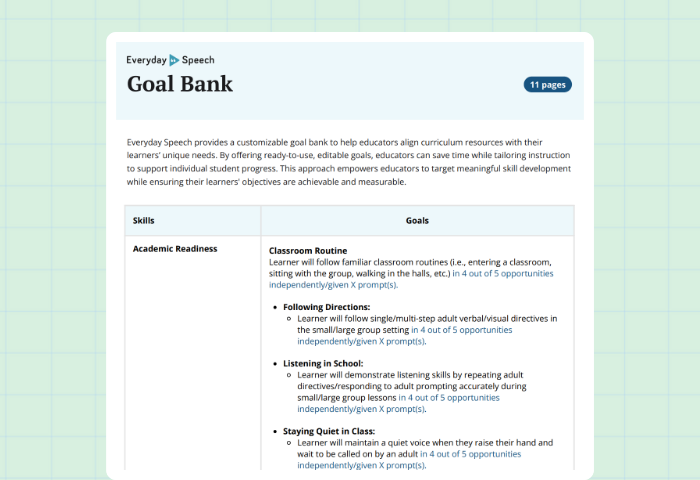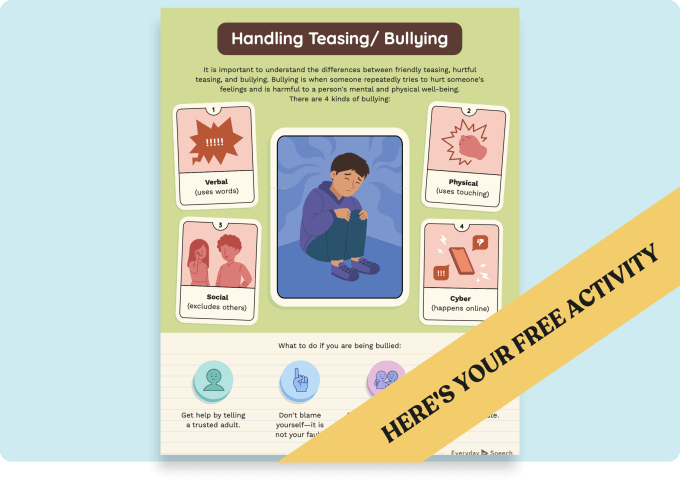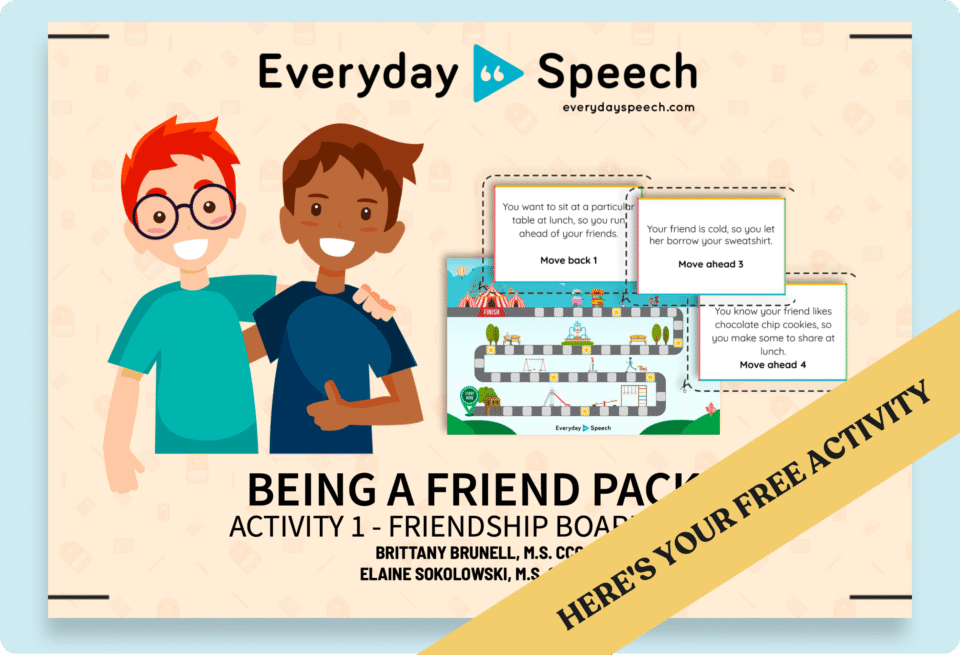Conversation Skills Activity for Middle School: Drive the Conversation
Get free social skills materials
No-prep lessons on self-regulation, emotional recognition, conversation skills, and more.
Sign up hereActivities to Teach Conversation Skills
Help students start, maintain, and deepen peer interactions with no-prep printables and lessons.
Many middle school students can start a conversation, but continuing it can be a challenge. They might give short answers, go off topic, or change the subject too quickly. These patterns can make conversations feel one-sided or disconnected. As a result, students often miss opportunities to connect with peers in meaningful ways.
Related resources:
The Drive the Conversation activity teaches students how to keep a conversation going. Through role-play, guided prompts, and reflection, students practice using follow-up questions, comments, and nonverbal cues to stay engaged and support the flow of conversation.
This article includes:
- A breakdown of the key conversation skills
- A complete lesson plan for speech groups, small-group instruction, or class-wide implementation
- Optional activities to extend learning
- A link to download the printable resource
Why Middle Schoolers Struggle to Sustain Conversations
By this stage, most students can say hello or introduce a topic. What they often lack is the ability to respond in a way that keeps the exchange moving. Common challenges include:
- Repeating the same answer without adding new information
- Answering questions but not asking any in return
- Speaking off topic or shifting the subject too quickly
- Missing opportunities to show interest or engagement
These are complex pragmatic language skills. Students need explicit instruction and repeated opportunities to practice them in realistic scenarios. This activity helps students learn what to say next, how to stay relevant, and how to participate in a conversation that lasts more than one or two turns.
Middle School Activity: Drive the Conversation
This free resource includes:
- A teacher-led lesson with conversation starter flashcards
- Two stages of guided partner practice that focus on turn-taking and enrichment
- A printable worksheet with realistic prompts that help students write effective follow-up responses
The activity can be used in speech sessions, social skills groups, or classroom lessons that focus on communication and peer connection.
Activities to Teach Conversation Skills
Help students start, maintain, and deepen peer interactions with no-prep printables and lessons.
Lesson Plan: Teaching Conversation Maintenance
This 30–40 minute lesson is best suited for small-group work but can be adapted for full-class use. It is especially effective for students working on pragmatic language or social communication goals.
Step 1: Use a simple metaphor (5 minutes)
Start with a metaphor that helps students understand the skill: “A conversation is like a game of catch. One person throws the ball by saying something, and the other catches it and throws it back. If someone drops the ball or walks away, the game ends.”
Invite students to describe how it feels when someone gives a one-word answer or changes the subject too soon.
Step 2: Partner Practice Round 1 – Turn-Taking (10 minutes)
Give each pair a flashcard with a simple conversation starter. Set a timer for two minutes. The goal is to keep the conversation going without awkward pauses or topic changes. Encourage students to:
- Take turns adding a sentence
- Avoid repeating the same ideas
- Make sure each person has a chance to talk
After the timer, reflect as a group. What helped the conversation keep going? What made it stop?
Step 3: Partner Practice Round 2 – Enrichment (10–12 minutes)
Teach students three ways to enrich a conversation:
- Add a new detail
- Ask a follow-up question
- Make a comment that shows interest
Model a basic response and then show how to enrich it:
- Prompt: “What do you like to do after school?”
- Basic: “I go on my phone.”
- Enriched: “I usually watch soccer videos or scroll through music clips. Do you ever watch sports online?”
Have students repeat the partner activity using the same or new prompts, this time with a focus on enrichment.
Step 4: Apply the Skill With the Worksheet (10 minutes)
Hand out the printable Driving the Conversation: Comments and Questions worksheet. Each prompt represents a real-life moment when a student could help move the conversation forward. Ask students to write either a comment or a question they could use in that moment.
Review their responses together and offer feedback. Highlight when responses are on-topic, add detail, or invite the listener to keep going.
Optional Follow-Up Activities
If you want to revisit this skill over time, try one of these:
Hot Seat Challenge: Choose one student to answer rapid-fire questions for 30 seconds. Then switch roles. Afterward, discuss what made the conversation feel smooth or what caused it to break down.
Conversation Recovery Practice: In a partner exchange, pause when the conversation slows down. Ask students what they could say to bring it back. This helps normalize repair and gives students a backup plan when they feel stuck.
Mini Reflection Journal: Have students write about a real conversation they had that day. Did they keep it going? What could they try differently next time?
Supporting Social Success Through Conversation Skills
Keeping a conversation going requires more than just speaking. It involves listening closely, offering thoughtful responses, and showing interest in the other person’s ideas. These skills help students feel more confident, more connected, and more able to participate in social and academic settings.
This activity supports IEP goals related to topic maintenance, conversational reciprocity, and perspective-taking. It also gives students a structure they can carry into group work, lunch table conversations, and peer interactions outside of school.




